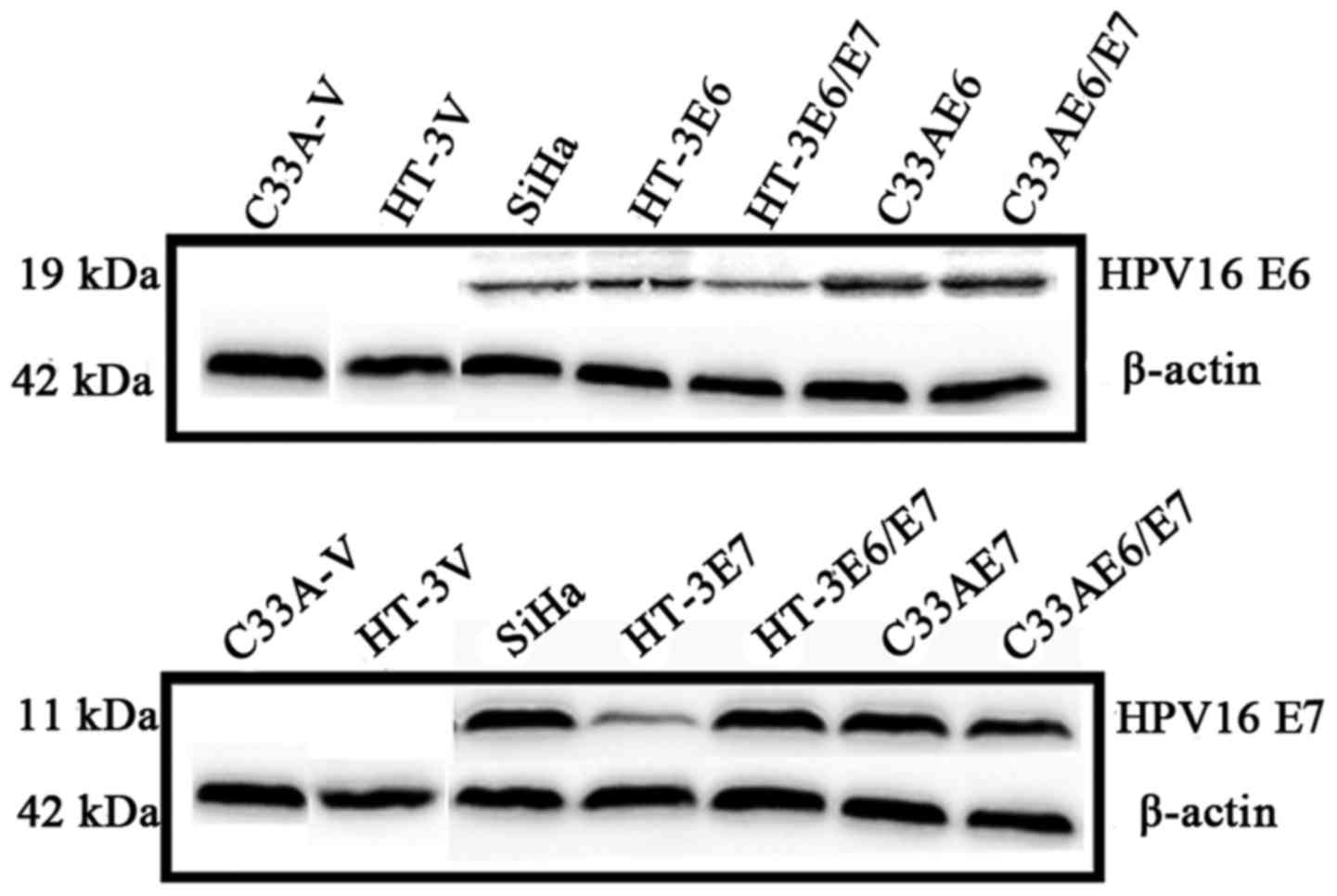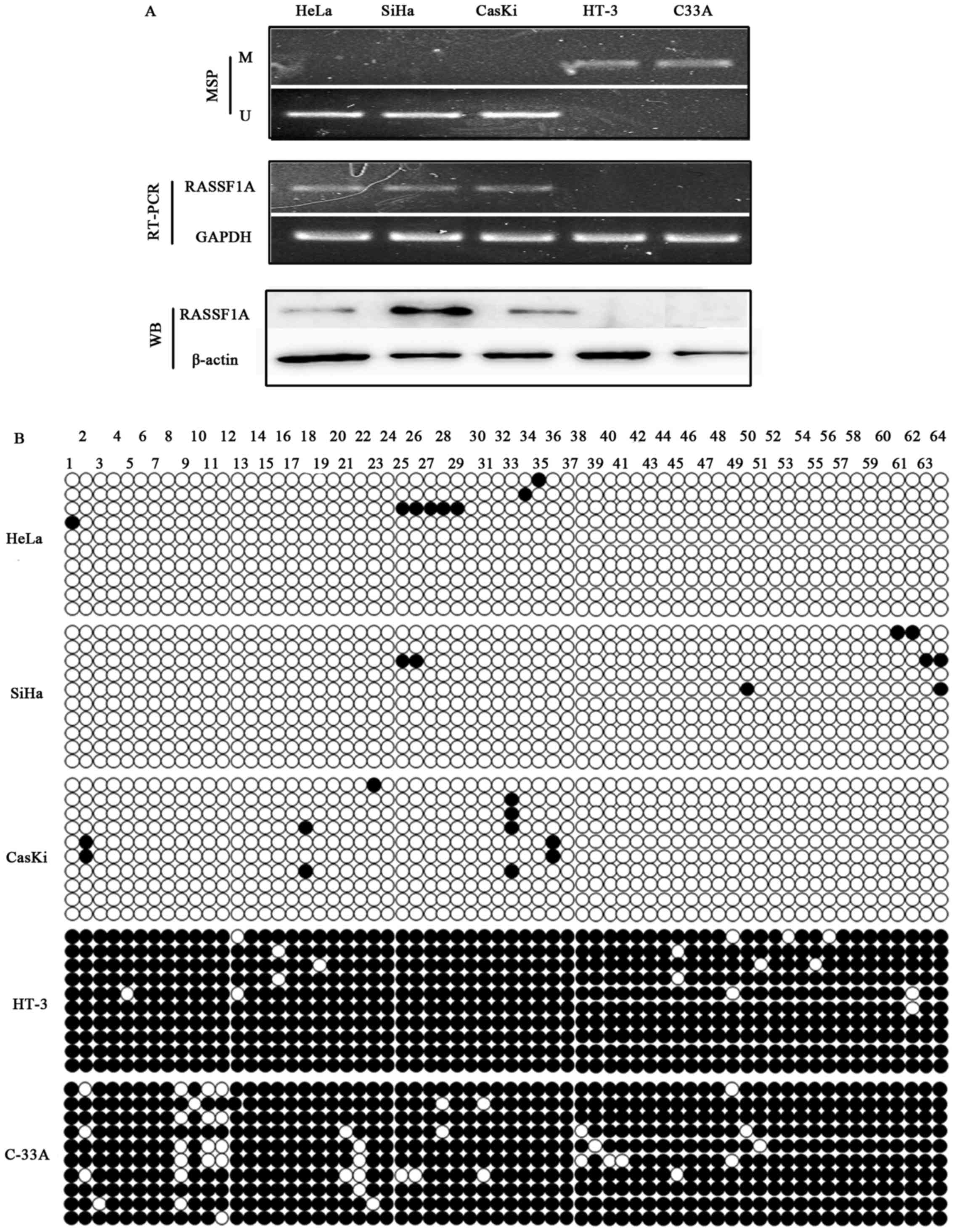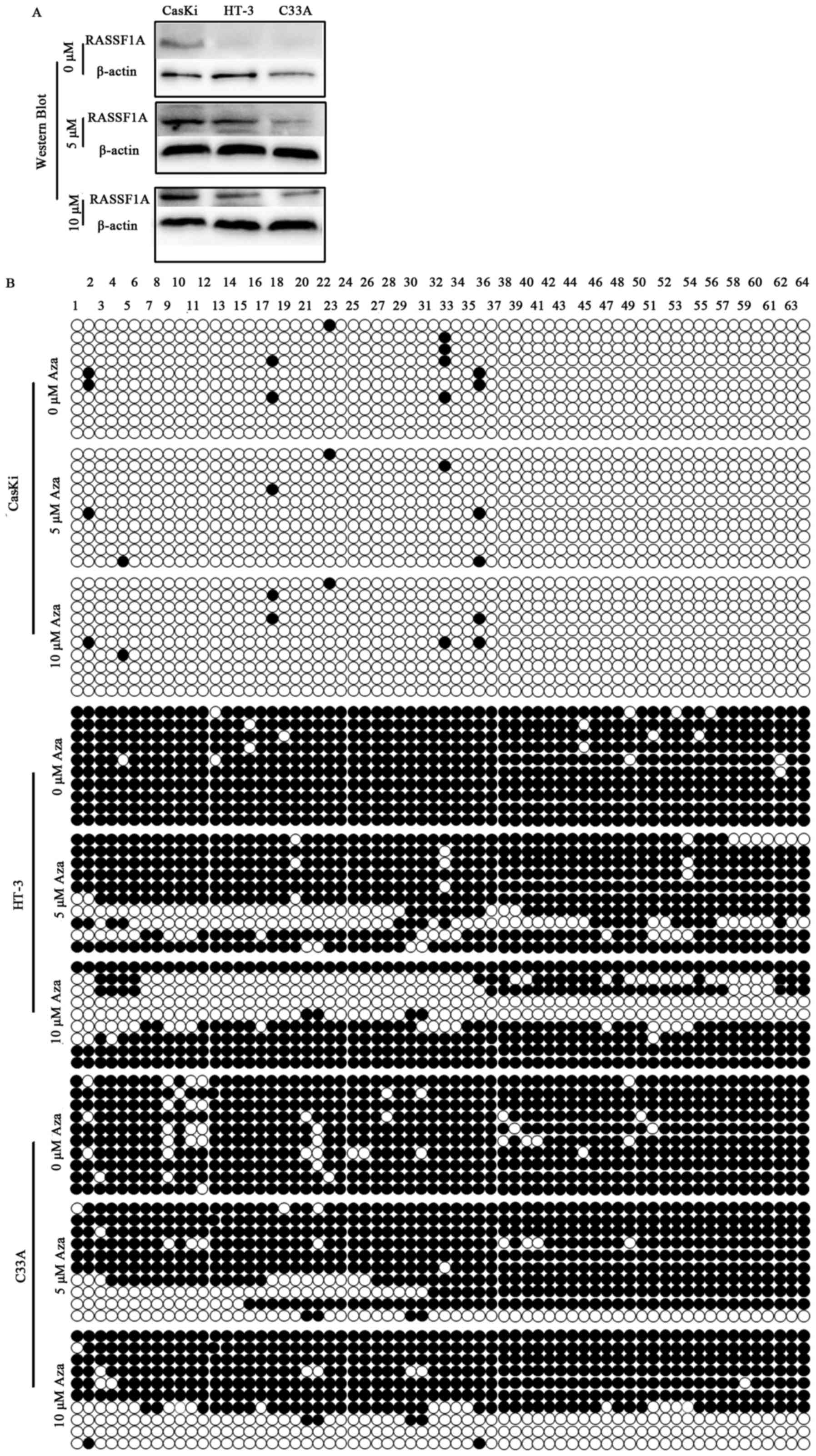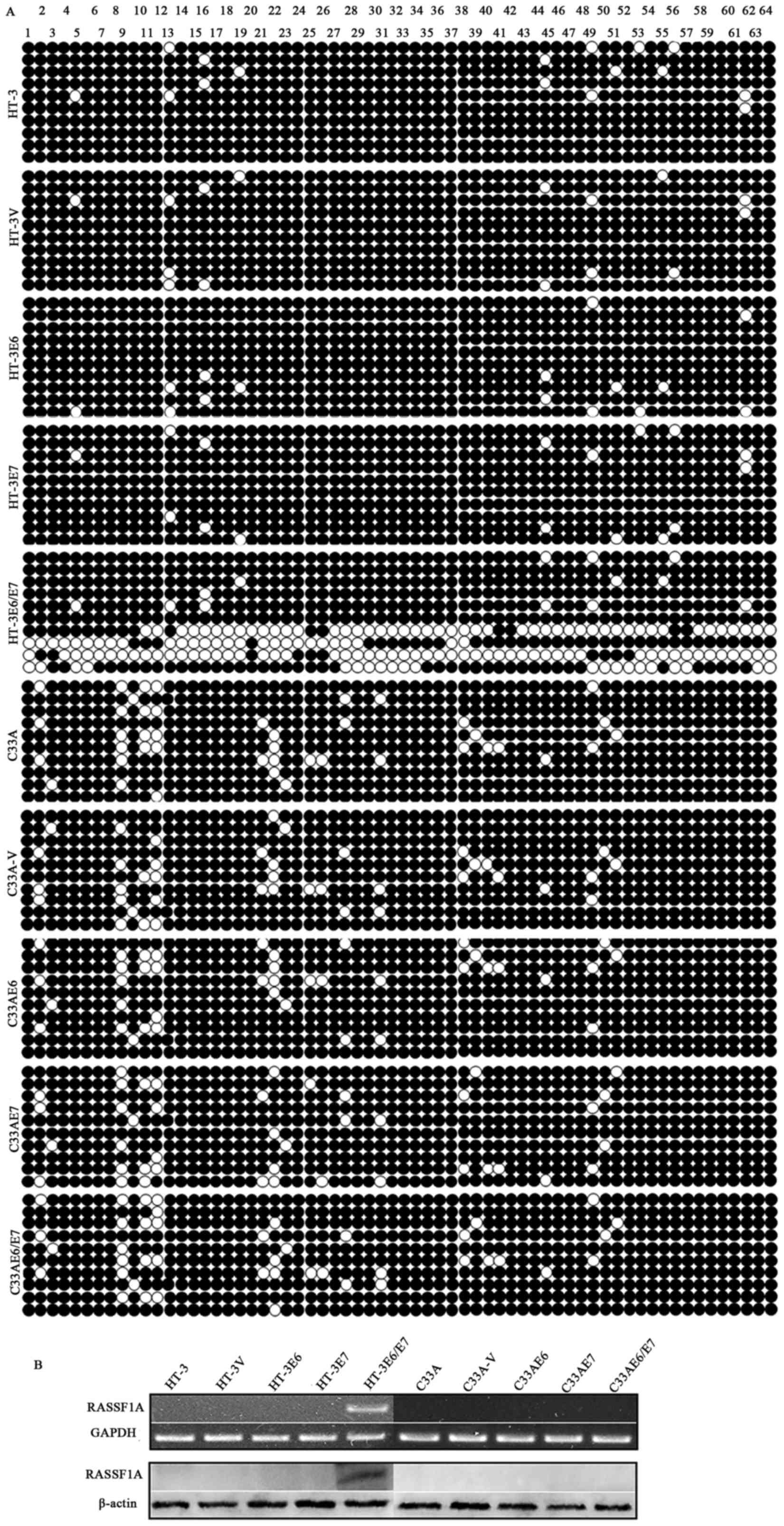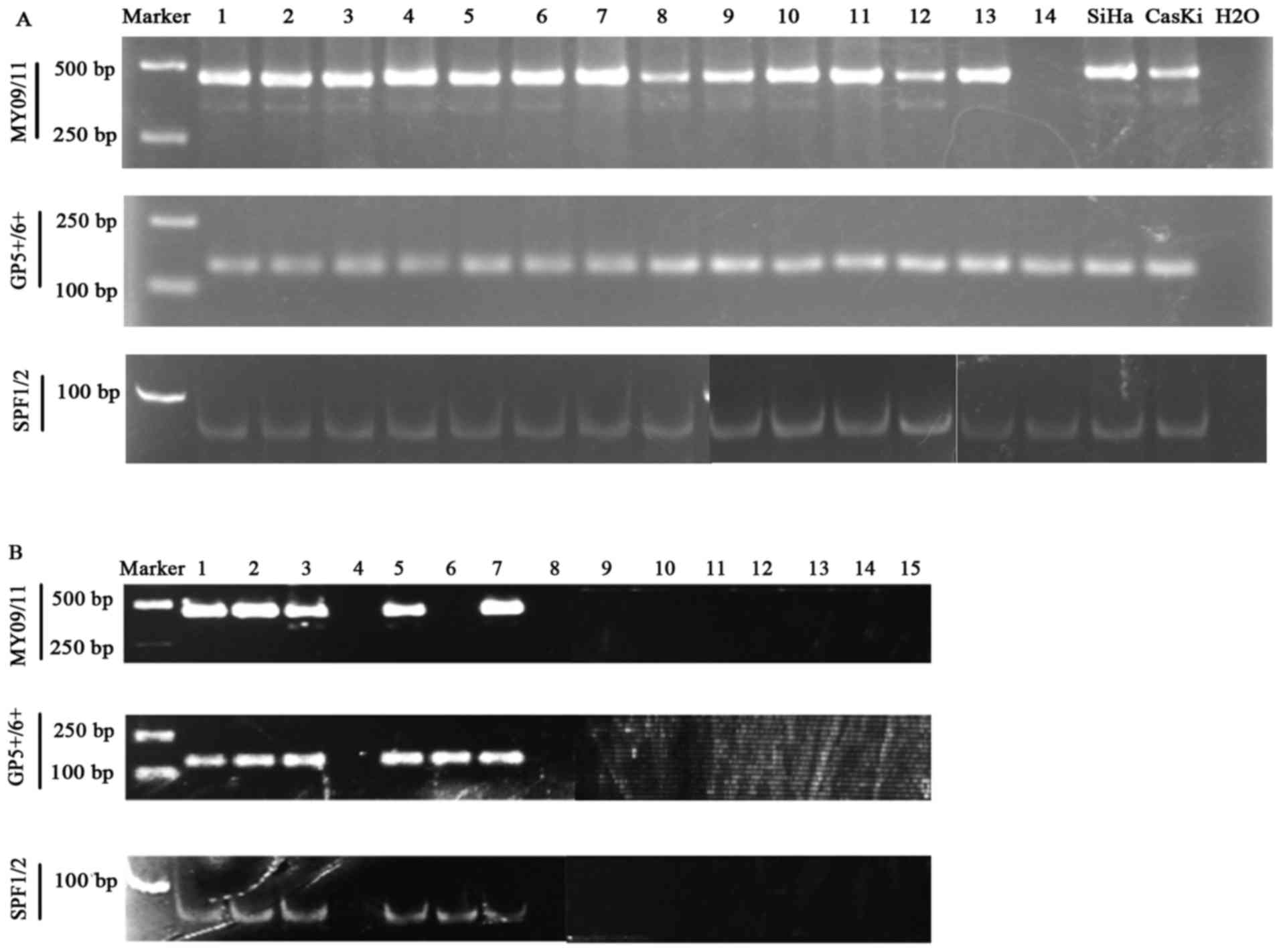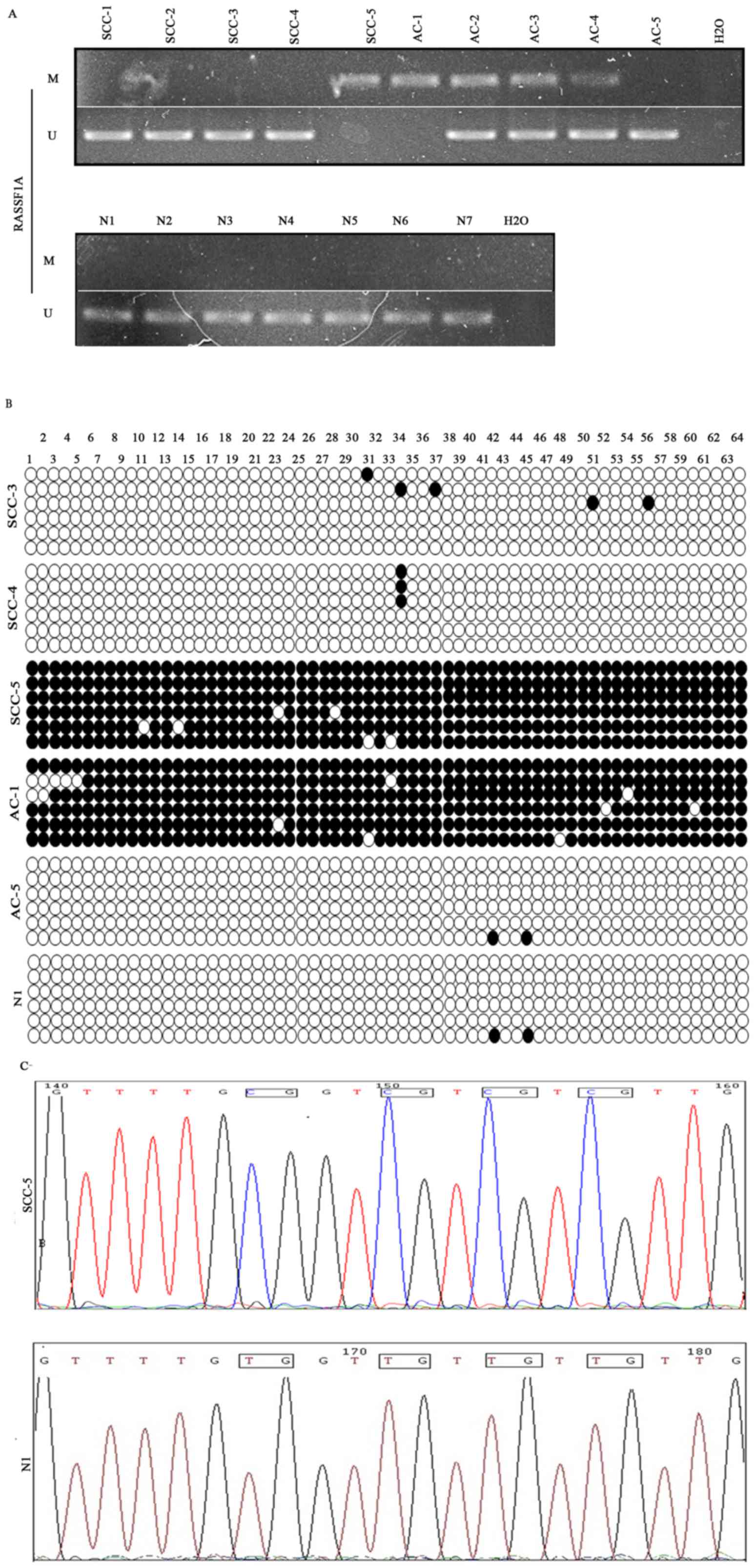|
1
|
Ferlay J, Shin HR, Bray F, Forman D,
Mathers C and Parkin DM: Estimates of worldwide burden of cancer in
2008: GLOBOCAN 2008. Int J Cancer. 127:2893–2917. 2010. View Article : Google Scholar : PubMed/NCBI
|
|
2
|
Feinberg AP and Tycko B: The history of
cancer epigenetics. Nat Rev Cancer. 4:143–153. 2004. View Article : Google Scholar : PubMed/NCBI
|
|
3
|
zur Hausen H: Papillomaviruses in
anogenital cancer as a model to understand the role of viruses in
human cancers. Cancer Res. 49:4677–4681. 1989.PubMed/NCBI
|
|
4
|
Kitchener HC, Denton K, Soldan K and
Crosbie EJ: Developing role of HPV in cervical cancer prevention.
BMJ. 347:f47812013. View Article : Google Scholar : PubMed/NCBI
|
|
5
|
Ajiro M and Zheng ZM: E6^E7, a novel
splice isoform protein of human papillomavirus 16, stabilizes viral
E6 and E7 oncoproteins via HSP90 and GRP78. MBio. 6:e02068–e14.
2015. View Article : Google Scholar : PubMed/NCBI
|
|
6
|
Narisawa-Saito M and Kiyono T: Basic
mechanisms of high-risk human papillomavirus-induced
carcinogenesis: Roles of E6 and E7 proteins. Cancer Sci.
98:1505–1511. 2007. View Article : Google Scholar : PubMed/NCBI
|
|
7
|
Flatley JE, McNeir K, Balasubramani L,
Tidy J, Stuart EL, Young TA and Powers HJ: Folate status and
aberrant DNA methylation are associated with HPV infection and
cervical pathogenesis. Cancer Epidemiol Biomarkers Prev.
18:2782–2789. 2009. View Article : Google Scholar : PubMed/NCBI
|
|
8
|
Ostör AG: Natural history of cervical
intraepithelial neoplasia: A critical review. Int J Gynecol Pathol.
12:186–192. 1993. View Article : Google Scholar : PubMed/NCBI
|
|
9
|
Neyaz MK, Kumar RS, Hussain S, Naqvi SH,
Kohaar I, Thakur N, Kashyap V, Das BC, Husain SA and Bharadwaj M:
Effect of aberrant promoter methylation of FHIT and RASSF1A genes
on susceptibility to cervical cancer in a North Indian population.
Biomarkers. 13:597–606. 2008. View Article : Google Scholar : PubMed/NCBI
|
|
10
|
Baylin SB: The cancer epigenome: Its
origins, contributions to tumorigenesis, and translational
implications. Proc Am Thorac Soc. 9:64–65. 2012. View Article : Google Scholar : PubMed/NCBI
|
|
11
|
Xiong J, Li Y, Huang K, Lu M, Shi H, Ma L,
Luo A, Yang S, Lu Z, Zhang J, et al: Association between DAPK1
promoter methylation and cervical cancer: A meta-analysis. PLoS
One. 9:e1072722014. View Article : Google Scholar : PubMed/NCBI
|
|
12
|
Song MS, Song SJ, Ayad NG, Chang JS, Lee
JH, Hong HK, Lee H, Choi N, Kim J, Kim H, et al: The tumour
suppressor RASSF1A regulates mitosis by inhibiting the APC-Cdc20
complex. Nat Cell Biol. 6:129–137. 2004. View Article : Google Scholar : PubMed/NCBI
|
|
13
|
Shivakumar L, Minna J, Sakamaki T, Pestell
R and White MA: The RASSF1A tumor suppressor blocks cell cycle
progression and inhibits cyclin D1 accumulation. Mol Cell Biol.
22:4309–4318. 2002. View Article : Google Scholar : PubMed/NCBI
|
|
14
|
Agathanggelou A, Cooper WN and Latif F:
Role of the Ras-association domain family 1 tumor suppressor gene
in human cancers. Cancer Res. 65:3497–3508. 2005. View Article : Google Scholar : PubMed/NCBI
|
|
15
|
Whang YM, Kim YH, Kim JS and Yoo YD:
RASSF1A suppresses the c-Jun-NH2-kinase pathway and inhibits cell
cycle progression. Cancer Res. 65:3682–3690. 2005. View Article : Google Scholar : PubMed/NCBI
|
|
16
|
Peters I, Rehmet K, Wilke N, Kuczyk MA,
Hennenlotter J, Eilers T, Machtens S, Jonas U and Serth J: RASSF1A
promoter methylation and expression analysis in normal and
neoplastic kidney indicates a role in early tumorigenesis. Mol
Cancer. 6:492007. View Article : Google Scholar : PubMed/NCBI
|
|
17
|
Gao T, Wang S, He B, Pan Y, Song G, Gu L,
Chen L, Nie Z, Xu Y and Li R: The association of RAS association
domain family Protein1A (RASSF1A) methylation states and bladder
cancer risk: A systematic review and meta-analysis. PLoS One.
7:e483002012. View Article : Google Scholar : PubMed/NCBI
|
|
18
|
Hagrass HA, Pasha HF, Shaheen MA, Bary
Abdel EH and Kassem R: Methylation status and protein expression of
RASSF1A in breast cancer patients. Mol Biol Rep. 41:57–65. 2014.
View Article : Google Scholar : PubMed/NCBI
|
|
19
|
Malpeli G, Amato E, Dandrea M, Fumagalli
C, Debattisti V, Boninsegna L, Pelosi G, Falconi M and Scarpa A:
Methylation-associated down-regulation of RASSF1A and up-regulation
of RASSF1C in pancreatic endocrine tumors. BMC Cancer. 11:3512011.
View Article : Google Scholar : PubMed/NCBI
|
|
20
|
Wu K, Xu XN, Chen Y, Pu XL, Wang BY and
Tang XD: RASSF1A gene methylation is associated with nasopharyngeal
carcinoma risk in Chinese. Asian Pac J Cancer Prev. 16:2283–2287.
2015. View Article : Google Scholar : PubMed/NCBI
|
|
21
|
Maliukova AV, Loginov VI, Khodyrev DS,
Kadyrova EL, Pronina IV, Ivanova TA, Kiselev FL, Zabarovskiĭ NP and
Braga EA: Methylation of the putative tumor suppressor gene,
RASSF1A, in primary cervical tumors. Mol Biol (Mosk). 38:1005–1013.
2004.(In Russian). PubMed/NCBI
|
|
22
|
Pfeifer GP and Dammann R: Methylation of
the tumor suppressor gene RASSF1A in human tumors. Biochemistry
(Mosc). 70:576–583. 2005. View Article : Google Scholar : PubMed/NCBI
|
|
23
|
Li JY, Huang T, Zhang C, Jiang DJ, Hong
QX, Ji HH, Ye M and Duan SW: Association between RASSF1A promoter
hypermethylation and oncogenic HPV infection status in invasive
cervical cancer: A meta-analysis. Asian Pac J Cancer Prev.
16:5749–5754. 2015. View Article : Google Scholar : PubMed/NCBI
|
|
24
|
Kuzmin I, Liu L, Dammann R, Geil L,
Stanbridge EJ, Wilczynski SP, Lerman MI and Pfeifer GP:
Inactivation of RAS association domain family 1A gene in cervical
carcinomas and the role of human papillomavirus infection. Cancer
Res. 63:1888–1893. 2003.PubMed/NCBI
|
|
25
|
Muñoz J, Inda MM, Lázcoz P, Zazpe I, Fan
X, Alfaro J, Tuñón T, Rey JA and Castresana JS: Promoter
methylation of RASSF1A associates to adult secondary glioblastomas
and pediatric glioblastomas. ISRN Neurol.
2012:5765782012.PubMed/NCBI
|
|
26
|
Shukla S, Bharti AC, Mahata S, Hussain S,
Hedau S, Sharma R, Pillai MR, Krishna S, Chiplunkar S, Tongaonkar
H, et al: Application of a multiplex PCR to cervical cells
collected by a paper smear for the simultaneous detection of all
mucosal human papillomaviruses (HPVs) and typing of high-risk HPV
types 16 and 18. J Med Microbiol. 59:1303–1310. 2010. View Article : Google Scholar : PubMed/NCBI
|
|
27
|
Lee SH, Vigliotti VS, Vigliotti JS and
Pappu S: Validation of human papillomavirus genotyping by signature
DNA sequence analysis. BMC Clin Pathol. 9:32009. View Article : Google Scholar : PubMed/NCBI
|
|
28
|
Gal-Yam EN, Saito Y, Egger G and Jones PA:
Cancer epigenetics: Modifications, screening, and therapy. Annu Rev
Med. 59:267–280. 2008. View Article : Google Scholar : PubMed/NCBI
|
|
29
|
Esteller M: Epigenetics in cancer. N Engl
J Med. 358:1148–1159. 2008. View Article : Google Scholar : PubMed/NCBI
|
|
30
|
Paschos K and Allday MJ: Epigenetic
reprogramming of host genes in viral and microbial pathogenesis.
Trends Microbiol. 18:439–447. 2010. View Article : Google Scholar : PubMed/NCBI
|
|
31
|
Woodman CB, Collins SI and Young LS: The
natural history of cervical HPV infection: Unresolved issues. Nat
Rev Cancer. 7:11–22. 2007. View
Article : Google Scholar : PubMed/NCBI
|
|
32
|
Meng W, Huebner A, Shabsigh A, Chakravarti
A and Lautenschlaeger T: Combined RASSF1A and RASSF2A promoter
methylation analysis as diagnostic biomarker for bladder cancer.
Mol Biol Int. 2012:7018142012. View Article : Google Scholar : PubMed/NCBI
|
|
33
|
Senchenko VN, Kisseljova NP, Ivanova TA,
Dmitriev AA, Krasnov GS, Kudryavtseva AV, Panasenko GV, Tsitrin EB,
Lerman MI, Kisseljov FL, et al: Novel tumor suppressor candidates
on chromosome 3 revealed by NotI-microarrays in cervical cancer.
Epigenetics. 8:409–420. 2013. View Article : Google Scholar : PubMed/NCBI
|
|
34
|
Cohen Y, Singer G, Lavie O, Dong SM,
Beller U and Sidransky D: The RASSF1A tumor suppressor gene is
commonly inactivated in adenocarcinoma of the uterine cervix. Clin
Cancer Res. 9:2981–2984. 2003.PubMed/NCBI
|
|
35
|
Yu MY, Tong JH, Chan PK, Lee TL, Chan MW,
Chan AW, Lo KW and To KF: Hypermethylation of the tumor suppressor
gene RASSFIA and frequent concomitant loss of heterozygosity at
3p21 in cervical cancers. Int J Cancer. 105:204–209. 2003.
View Article : Google Scholar : PubMed/NCBI
|
|
36
|
Guo W, Cui L, Wang C, Guo Y, Shen S, Kuang
G and Dong Z: Decreased expression of RASSF1A and up-regulation of
RASSF1C is associated with esophageal squamous cell carcinoma. Clin
Exp Metastasis. 31:521–533. 2014. View Article : Google Scholar : PubMed/NCBI
|
|
37
|
Numoto K, Yoshida A, Sugihara S, Kunisada
T, Morimoto Y, Yoneda Y, Fujita Y, Nishida K, Ouchida M and Ozaki
T: Frequent methylation of RASSF1A in synovial sarcoma and the
anti-tumor effects of 5-aza-2′-deoxycytidine against synovial
sarcoma cell lines. J Cancer Res Clin Oncol. 136:17–25. 2010.
View Article : Google Scholar : PubMed/NCBI
|
|
38
|
Borden EC: Augmentation of effects of
interferon-stimulated genes by reversal of epigenetic silencing:
Potential application to melanoma. Cytokine Growth Factor Rev.
18:491–501. 2007. View Article : Google Scholar : PubMed/NCBI
|
|
39
|
Deshpande R, Mansara P and Kaul-Ghanekar
R: Alpha-linolenic acid regulates Cox2/VEGF/MAP kinase pathway and
decreases the expression of HPV oncoproteins E6/E7 through
restoration of p53 and Rb expression in human cervical cancer cell
lines. Tumour Biol. 37:3295–3305. 2016. View Article : Google Scholar : PubMed/NCBI
|
|
40
|
Shaikh F, Sanehi P and Rawal R: Molecular
screening of compounds to the predicted Protein-Protein Interaction
site of Rb1-E7 with p53- E6 in HPV. Bioinformation. 8:607–612.
2012. View Article : Google Scholar : PubMed/NCBI
|
|
41
|
Farthing AJ and Vousden KH: Functions of
human papillomavirus E6 and E7 oncoproteins. Trends Microbiol.
2:170–174. 1994. View Article : Google Scholar : PubMed/NCBI
|
|
42
|
Naryshkin S and Austin RM: Limitations of
widely used high-risk human papillomavirus laboratory-developed
testing in cervical cancer screening. Drug Healthc Patient Saf.
4:167–172. 2012. View Article : Google Scholar : PubMed/NCBI
|
|
43
|
Nocon M, Roll S, Mittendorf T, von der
Schulenburg JM and Willich SN: Human papilloma virus (HPV) testing
for cervical carcinoma screening. Z Evid Fortbild Qual Gesundhwes.
104:138–142. 2010.(In German). View Article : Google Scholar : PubMed/NCBI
|
|
44
|
Feng W, Shen L, Wen S, Rosen DG, Jelinek
J, Hu X, Huan S, Huang M, Liu J, Sahin AA, et al: Correlation
between CpG methylation profiles and hormone receptor status in
breast cancers. Breast Cancer Res. 9:R572007. View Article : Google Scholar : PubMed/NCBI
|
|
45
|
Honda S, Haruta M, Sugawara W, Sasaki F,
Ohira M, Matsunaga T, Yamaoka H, Horie H, Ohnuma N, Nakagawara A,
et al: The methylation status of RASSF1A promoter predicts
responsiveness to chemotherapy and eventual cure in hepatoblastoma
patients. Int J Cancer. 123:1117–1125. 2008. View Article : Google Scholar : PubMed/NCBI
|
|
46
|
Lai HC, Lin YW, Chang CC, Wang HC, Chu TW,
Yu MH and Chu TY: Hypermethylation of two consecutive tumor
suppressor genes, BLU and RASSF1A, located at 3p21.3 in cervical
neoplasias. Gynecol Oncol. 104:629–635. 2007. View Article : Google Scholar : PubMed/NCBI
|















